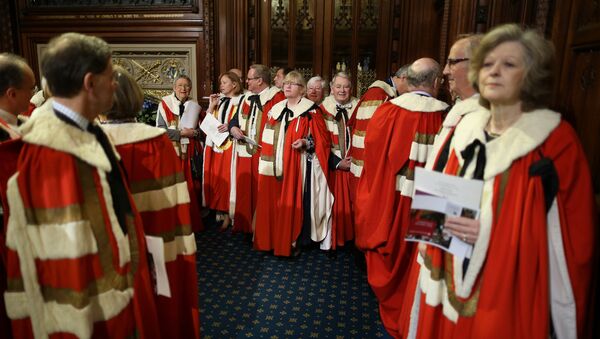Lord Ravensdale, 36, has been elected to the House of Lords after a by-election caused by the death of Viscount Slim.
Daniel Mosley — or the 4th Baron Ravensdale to give him his full title — is the great-grandson of Sir Oswald Mosley, who led the British Union of Fascists in the 1930s and was interned during the Second World War because of his sympathies with Hitler and Mussolini.
Ravensdale, 36, was one of 14 candidates but the most remarkable thing about the election was that there were only 31 people eligible to vote — all of them themselves hereditary Lords of the realm.
Yesterday Lord Ravensdale was announced as the winner of the latest House of Lords hereditary peer by-election: https://t.co/IIypjOI41n; age 36, he is now the youngest member of the House of Lords, and the first person born in the 1980s to sit in the House
— Mr Memory (@AmIRightSir) 28 March 2019
Hereditary peers — members of the British aristocracy — in the House of Lords have long rankled with the Labour Party and others who feel they are a vestige of a bygone age and not fit for purpose.
Tony Blair promised to reform the House of Lords when he won a landslide election in 1997 but the process got bogged down and hereditary peers remain.
Lord Ravensdale — whose grandfather was a member of the House of Lords between 1966 and 1999 — is an engineer and consultant who claimed in his mini manifesto to have "extensive experience of international defence and nuclear energy programmes".
"A political independent, I would champion the Midlands and commit to regular attendance alongside my consultancy work; benefiting the House by maintaining my expert knowledge of engineering and industry," Lord Ravensdale said in his campaign literature.
Ravensdale succeeded Viscount Slim, whose father was a First World War hero and commander of the Burma Corps in the Second World War and was given the title in 1960.
There was an election to the House of Lords today. The only one which there can ever be, that which takes place among hereditary peers for hereditary peers.
— Lewis Goodall (@lewis_goodall) 27 March 2019
Lord Ravensdale is the lucky winner of a place in our legislature.
He won 18 votes of 28 cast.
After his death in 1970 allegations emerged that the 1st Viscount Slim had sexually abused when he was Governor-General of Australia in the 1950s.
The 2nd Viscount Slim, who had also been a former soldier, served in the House of Lords from 1971 until his death in January this year.
Only 31 people were eligible to vote in Wednesday's by-election, all of them hereditary peers.
Eighteen voted for Lord Ravensdale while four voted for Lord Meston.
Meanwhile, Sir Oswald Mosley's great grandson has won a peer's byelection with 18 votes out of 28. He could be in the Lords for life.
— Joel Taylor (@JoelTaylorhack) 27 March 2019
Daniel Mosley, is the 4th Baron Ravensdale & says he is 'politically independent'.
The Ravensdale peerage was awarded to Lord Curzon in 1911.
Lord Ravensdale is now entitled to vote in the House of Lords, and draw daily expenses for attending, until his death.
Although Labour called for the abolition of the House of Lords and their replacement with a fully elected second house in its 2017 general election manifesto, reform of the House of Lords remains fairly low on the political agenda.
In 2014 the House of Lords Reform Act made some minor concessions, including allowing for hereditary peers to be expelled for the first time.
But Lord Black of Crossharbour — the Canadian-born former newspaper publisher Conrad Black — is still entitled to sit in the House of Lords, despite being a convicted felon in the United States.




